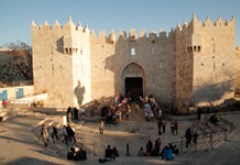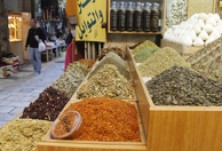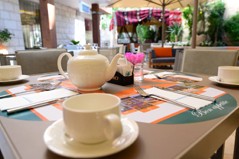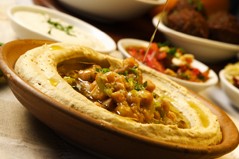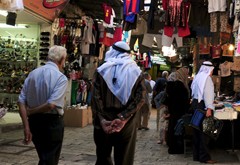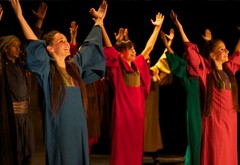Attaba, Maijana, and Zajal
Palestine is rich with folkloric popular singing, which expresses the general mood in the community. Sang in specific occasions, it is composed of poems in colloquial dialects, and sometimes in classical Arabic, most of which are spontaneously formed.
The Arab world shares many elements as far as music and singing are concerned, but each country has its special pop music and each region has its own specificities. Countries of the Levant share many pop songs, and in Palestine, there are songs for happy occasions like weddings, births, circumcisions, pilgrimage, the harvest, olive-picking, return of travelers, success in education, and others. Pop music also accompanies Dabkeh, the folkloric dance performed on these occasions. There are also songs for unhappy occasions, more among women than men.
Among the most famous songs in Palestine, whose lyrics change with time according to the subject, but maintaining the same refrain and beat, are 'Arrouzana, Tharif Attoul, Mijana, Dal'ounah, and Attaba. Songs are normally accompanied by playing a popular musical instrument or instruments, such as the drum, tambourine, fiddle, Arghul (an old, originally Egyptian type of flute), Mijwez (double flute), and the flute. Sometimes, songs are also accompanied by the Oud, Bouzouki, or even the Kanun (flat harp).
Popular singing, by men or women, is normally accompanied by Zaghareed (ululating), a deep sound that starts with a long "Haaaaaa," followed by a "Yeeehaaa," then a statement expressing joy and happiness. This refrain (Haaaheeehaaa) is then repeated, followed by another statement, and so on, ending with ululation by moving the tongue rapidly left and right inside the mouth. When the woman ululating reaches the end of her song, she is accompanied by a large number of women, producing a high-pitched crescendo.
The Zaghroudah is a women competition through which they boast, listing good qualities and feats. Relatives of the groom may clash with those of the bride in a fierce battle of Zaghareed, each boasting about their family or qualities of the bride or groom, sometimes ending with serious results.
Wedding
Like the rest of Palestine, weddings in Jerusalem are involved processes that pass through many stages that are difficult to shorten or reduce their cost. The process starts with the young man's decision to get married. If he has already selected a young woman and they agreed to get married, he will have relieved his mother of the chores of searching for a suitable wife. The groom's mother then visits, with her daughters, sisters, or other relatives, the bride's family to meet her son's choice and test her social adequacy, completely ignoring the prior arrangement between the potential couple. Women of both families get to know one another. If there is a minimal level of acceptance, they agree to meet again so that the young man comes with his parents to meet the girl's family. Normally, the girl's hand in marriage is proposed during this visit. The same ritual applies if the young man had not met a young girl, in which case his mother would look for a suitable girl for him.
The girl's father would then ask for a week or two for consultation. This period of time would be used to snoop around, asking about the prospective husband's and his family's manners and conduct. Relatives, friends, and colleagues at work are asked, and consultations are made with the bride's family. In the past, relatives would object to marriage to a stranger if a relative is available to marry the girl.
When the consultation period is over, there is a positive or negative response. If it is negative, the groom's family starts to exert pressure, and sometimes succeed in achieving acceptance. If the response is positive, a new stage of a long process starts. The girl's hand in marriage now has to be asked for formally through a Jaha; a delegation of dignitaries. The size of the Jaha is an expression of the groom's family status, and the respect they have towards the bride's family. The Jaha includes figures from the groom's family friends and relatives, as well as a respectable delegation of women. The delegation is received at the bride's family home, where an appropriate Jaha is also ready to receive them, as a sign of respect towards the groom's family. The girl's hand in marriage is requested in this meeting, in a declaration of the event and an announcement that the couple is officially engaged. The congregation then drinks coffee and eats sweets and fruits, and ululations pierce the air in an expression of joy and celebration. The Shaikh may be present (priest for Christian families) to prepare the wedding document. Food is sometimes served.
There is no specific time period for the duration of the engagement. The wedding date is normally specified in the summer after the engagement. The engagement period is used to develop the relationship between the bride and groom and further enhance ties between their families. Visits and banquets are held. The relationship may not work out, and the engagement period is considered an attempt to evaluate the potential for cohabitation. The engagement period is also used to prepare for the wedding and furnishing the couple's home. Basically, the groom shoulders most of this responsibility, and the groom's family does not participate substantially in the expenses. Some families insist on contributing, normally with generous gifts for the couple's home. In Christian families, the bride's family normally has a much larger financial obligation towards the couple than Muslim families.
With the arrival of the wedding date, a series of rituals start. The night before the wedding, a large party for men and another for women are held, well into the night. The bride does not participate in either, staying at home. This takes place in cities, but in rural areas, women from the bride's family go to the groom's family house for Hinna. The men's party is normally loud, with singing and dancing late into the night. Normally, men and women from the bride's family join the groom's family. Some light food, drinks, and sweets are served. Generally speaking, Christian families do not hold such a party.
On the next day (normally a Friday), food is served at the groom's family home (or more recently in community halls), and at the end of the day, the groom goes, accompanied by a large Jaha of men and women, to the bride's house, where rituals similar to those of the engagement ceremony take place. The bride is handed over to the groom, and a parade of cars forms from both families, heading for the wedding party location. In conservative families, the role of men comes to an end, and the wedding party is held by women, with the groom's presence. The groom's father and direct family members may enter to with the couple well and to congratulate them. In less conservative families, the wedding party is normally mixed. In this party, where no food is served, joy is the order of the night over many hours, with loud music and active dancing.
The next day, the bride's family visits their daughter in her new home, carrying presents. They are met by the groom's family. A day of congratulations and joy is then organized by the groom's mother to receive women relatives and friends and accept good wishes for happiness.
There are some variations for weddings in some parts of Palestine. For Christian families, the congregation moves to a hall, after the wedding ceremony at the church, to celebrate and have dinner. The party is mixed. Liberal Muslim families now do the same. In rural areas, celebrations sometimes continue for days.
Weddings in Palestine, among all classes, are public events in which hundreds of people participate, depending on the size of the extended family. Its rituals and ceremonies are very costly. Marriage at an early stage has receded to a large extent, particularly in cities. On average, men get married at the age of 25, and women at a slightly lower age.

